Date: November 5-6, 2020
Location: Online (via the platform Click-Meeting)
Please register for free here until noon (CET) November 1, 2020
Invitation Links will be shared after registration and shortly before the respective event.
Democratic institutions in the United States are often thought of as bulwarks against manifold threats, both from inside and outside of the American polity. Donald Trump’s first term in office has been a stress test to these democratic institutions and processes. This conference asks for the causes as well as the consequences of Trump’s electoral success. We consider illiberal tendencies as a serious political phenomenon in the United States and see Trump as a symptom of a longer-standing set of dynamics that we can better grasp through a comparative view and against the backdrop of global dynamics.
As a glimpse at different cases from Jair Bolsonaro to Viktor Orbán shows, demagogues, once in office, alter the structures of the state and civil society in ways that are likely to inflict long term damage. Compromises to the separation of powers, public officials' conflicts of interest, the defamation of the media: some of the essential pillars of democracy and core ideals of the Enlightenment are under attack.
As such, this conference examines the effects of Donald Trump on democratic processes and institutions, and reflects on the immediate and potential long-term consequences of his administration for democratic participation in the political system of the United States, and how these processes compare to other democracies in crisis.
Co-hosted by the Bard College Berlin & the John F. Kennedy Institute, Freie Universität Berlin
- with friendly support from the Atlantische Akademie & Philipp Schwartz Initiative -
Organizers: Aysuda Kölemen, Christian Lammert, David Sirakov & Boris Vormann
For inquiries about the event please contact us under politics@jfki.fu-berlin.de.
#Limits2Democracy #GAASPolSci20
Conference Schedule
Day 1 - Thursday, November 5, 202015:00-16:30
Opening Remarks & Panel 1: Trump in Power: Illiberalism and Democracy
Chair: Betsy Leimbigler (Freie Universität Berlin)
Michael Weinman (Bard College Berlin): A Passing Storm? American Illiberalism and the 2020 Elections
Jörg Hebenstreit (Friedrich-Schiller Universität Jena): Independence under Threat – Attempts of Expanding Presidential Supervisory Authority over Independent Agencies under the Trump Administration
Michael Dreyer (Friedrich-Schiller Universität Jena): Packing the Courts? Donald Trump, Checks and Balances, and the “Least Dangerous Branch”
Elena Broda (Universität Passau): Perfect Phone Call or Abuse of Power? How Ideological Media Framed Trump’s Impeachment
17:00-18:30
Panel 2: Fake News, Social Media, and Political Communication
Chair: Gülçin Balamir Coşkun (Humboldt Universität Berlin)
Maren Schäfer (Heidelberg Center for American Studies): “Totally Compromised Kangaroo Courts” and the “Fake News Media” – Donald Trump’s Anti-Democratic Right-Wing Populist Rhetoric
Curd Knüpfer (Freie Universität Berlin) and Michael Oswald (Universität Passau): Tapping the Sphere of Deviance: Right-wing News Sites as a Peripheral Network to the Trump-Fox News Information Nexus
Mike Cowburn (Freie Universität Berlin): Republican Legislator Adoption of the Fake News Label on Twitter
Martin Thunert (Heidelberg Center for American Studies): (Dis)Trust of Experts and Contemporary Populism: The Case of the United States in Perspective
19:30-21:00
Panel 2, Part 2: Assessing the Elections
Panel Chair: David Sirakov (Atlantische Akademie)
Sean Theriault (University of Texas): Congressional Elections: What Happened and Why?
Rachel Bitecofer (Niskanen Center): Negative Partisanship in the 2020 American Election
10:00-11:30
Business Meeting of the Politics Section
13:30 -14:45
Panel 3: The New Normal? International Relations under Trump
Panel Chair: Florian Böller (TU Kaiserslautern)
Cornelia-Adriana Baciu (Johns Hopkins University): Paradoxes of American Exceptionalism and Restraint. A Neo-Classical Realism Perspective
M.J. Packo (Humboldt Universität Berlin): The International Implications of Anti- abortion Rights Narratives under the Trump Administration
Ana-Constantina Frost (Freie Universität Berlin): Whose Foreign Policy Is It Anyway? Studying Diaspora Politics in a Time of International Upheaval
Jakob Wiedekind (Leibniz Universität Hannover): The New De Facto Veto? Tracing the Impact of SAPs as a New Measure of Presidential Power in Foreign Policy
15:00-16:15
Panel 4: Persisting Problems: Inequalities and Social Rights
Chair: Aysuda Kölemen (Bard College Berlin)
Guido Rohman (Freie Universität Berlin): ‘Left behind' - A Term We Should Leave Behind?
Betsy Leimbigler (Freie Universität Berlin): Interactions between Illiberalism and Institutions: Economic and Social Rights in the U.S.
Laura Kettel (Freie Universität Berlin): Contested Governance: The Federal Response to Homelessness in the United States
16:30-17:45
Panel 5: Race and Public Policy
Chair: Christian Lammert (FU Berlin)
Rachel Wetts (Brown University): Activating and Harnessing White Racial Prejudice in the 2020 US Election
Aysuda Kölemen (Bard College Berlin): Race as a Category in Evaluations of Deservingness and Undeservingness of Government Assistance
Candis Smith (Penn State University): Who Stands a Chance? Disparate Worldviews on the Social Constructions of Vulnerable Populations
19:00-20:30
What Is to Be Done?
Keynote Lecture by Ruth Wilson Gilmore (CUNY Graduate Center)
Introduction: Boris Vormann (Bard College Berlin)
Time & Location
Nov 05, 2020 - Nov 06, 2020
Online Conference; please register beforehand.

